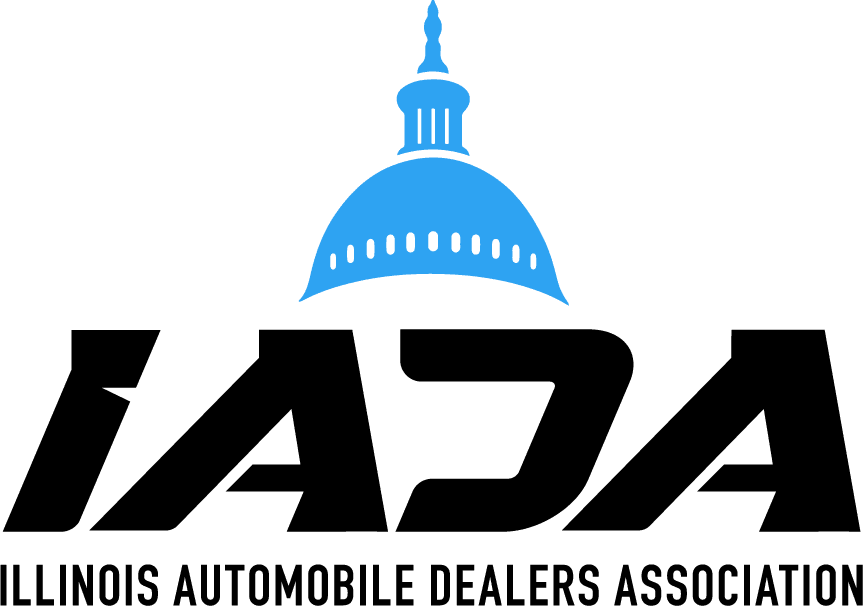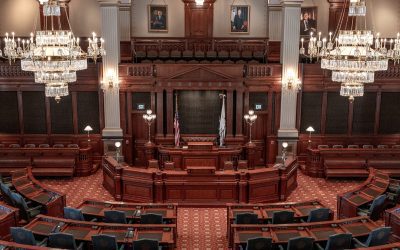
Dealer Licensing Requirements
Application For New Motor Vehicle Dealer License
The Illinois Secretary of State requires the following in regard to the establishment of a new car facility.
- An application for a new vehicle dealer’s license to be filed with the Secretary of State.
- A statement that the applicant has been approved for registration under the Retailer’s Occupation Tax Act.
- A statement from each manufacturer, stating that a franchise has been awarded to said corporation.
- A Certificate of Insurance, that the policy held provides coverage in minimum amounts of $100,000 for bodily injury to, or death of, any one person; $300,000 for bodily injury to, or death of, two or more persons in any one accident; and $50,000 for damage to property. Such policy should not expire any sooner than December 31st of the year for which the license is issued.
- A $1000.00 license fee for applicants established place of business, but if such application is made after July 1st, the license fee is $500.00.
- A bond or certificate of deposit in the amount of $20,000 for each location at which applicant intends to act as a new vehicle dealer. After three years of operation, new car dealers are exempt from the bonding renewal requirements.
Every dealer will receive a renewal application from the Secretary of State in August. This form should be completed and returned with an accompanying check or money order before November 15 to insure that the renewal will be processed before December 31st, the date of expiration for all dealer licenses.
Any changes affecting the dealership’s name, address and corporate structure require that the dealer make an application for a new license, The Secretary of State’s fee for this service is $2.00.
The dealer is also required to contact the Department of Revenue and inform them of the change. Once you receive a new tax clearance from the Department of Revenue, you must submit it to the Secretary of State’s office. The dealer must also submit a corrected Certificate of Insurance reflecting the change.
Once the dealer surrenders his/her previous Certificate of Authority, then the Secretary of State will issue a new once with the correct name, address and business entity.
If any one of the following changes occur, dealers should contact the Dealer License Section so that the correct applications will be mailed.
- Moving to a new address.
- Closing a licensed location.
- Opening another place of business, in addition to your established location.
- Changing officers or directors of a corporation.
- Changing the name of a business.
- Adding or dropping a franchise to sell to vehicles.
- Fees will be required for all corrected documents.
Each person seeking to be or already duly licensed as a new or used vehicle dealer under the Illinois Vehicle Code shall maintain an established place of business which shall, be regularly occupied for the primary and principal purpose of selling, buying, bartering, exchanging or dealing in vehicles and have on display, vehicles held for sale, resale or exchange.
In addition, each person shall also have facilities within such established place of business to carry out and honor warranties or undertaking made to buyers or venders and to place vehicles in safe operating condition. However, the dealer may meet this requirement by a written contract for the use of and by using a nearby established repair shop or garage. An established place of business shall not include a residence tent; temporary stand; temporary address; office space; or room or rooms in a hotel, rooming house or the premises occupied by a single or multiple unit dwelling house.
The office space used by a dealer must be properly and permanently equipped with the necessary office equipment and machines, and documents and papers adequate to properly conduct business conduct business as a dealer and must be within a permanent building or structure. Additionally, the following requirements must be met:
- Have office facilities in a building for maintaining and keeping required books and records. The office facilities shall be permanently mounted on a fixed foundation and may not include a trailer with axle attached and still moveable. It may include, however, an office trailer or house trailer in a licensed mobile home park or dealership lot with tires removed and utilities attached.
- Be properly equipped with the necessary office equipment and machines, and documents and papers adequate to properly conduct business as a dealer and must be within a permanent building or structure.
- Be equipped with an operating telephone for inbound and outbound calls and have the business telephone number published in the telephone directory generally available in the dealership area, and adequately equipped with operating electric lights.
- Have the name of the dealership posted on the front entrance door.
- Have posted on the front entrance door a sign setting forth the days and regular and reasonable hours when open for business. A dealership shall not be deemed as being open for business unless at least one employee, who is able to conduct regular business, is on the premises and available to the public. The dealership must also be operated consistent with general dealer practices. The dealership must be open for business at least five (5) days out of each seven (7) days in a week, and a minimum of four (4) hours consecutive per day. However, dealers who operate their dealerships less than a full 12 month period shall state in the license application those months in which the dealership is closed and shall not be required to maintain regular business hours during the period of closure. The months of closure should also be posted in a prominent place for the public to see.
- Maintain a lot, being the area not occupied by a building, which shall be surfaced with rock or better surface material, and which shall be properly illuminated, if open after sundown, so that vehicles for sale can be properly inspected by any prospective customer.
- The lot used for sale of vehicles shall be separate and apart from any other business. In addition, where a dealer is selling both new and used cars, the new cars shall be parked separately and apart from used cars.
- The above lot requirement shall not be applicable where the place of business has an indoor showroom, properly illuminated, for the display of vehicles held for sale.
- The separate lot requirement specified above shall not prohibit the operation by the dealer of other businesses on the same premises, which shall include the lot, provided that the businesses are reasonably related to the sale or operation of new or used automobiles, and provided further that the sale of new or used automobiles shall constitute at least 50% of the gross revenues of the licensed dealer, and the sale of automobiles shall be the primary business of the licensed dealer. No business defined as reasonably related to the sale of automobiles shall exceed 50% of the gross revenues of the business entities using the lot. Businesses reasonably related to the sale or operation of automobiles shall include only the sale of automobile parts and accessories, the sale of gasoline, diesel fuel, oil and lubricant, the sale of automobile tires, the leasing of automobiles, insuring automobiles and the financing of automobiles sold by the licensed dealers engaged in these businesses. Licensed dealers engaged in operating businesses other than those stated shall remove such businesses or modify them to comply with this rule within 60 days of notification by the Secretary of State, or be subject to the revocation or suspension of their dealers license.
- Dealership in a Department Store – Where a dealer maintains a place of business within a department store, the dealership shall be separated from other operations within the department store.
- Sign – Display a permanent sign bearing the name of the dealership which shall be properly illuminated if open after sundown and which shall be visible from the highway leading to the established place of business.
- Display a federally required price label on all new motor vehicles held for sale, and a used car label on all used vehicles held for sale.
- If the premises are leased, such lease must be for at least the duration of the current licensing period.
An Illinois licensed dealer may operate as an additional place of business a permanent supplemental lot which must meet all the requirements of the established place of business except the records required to be kept shall be maintained at the principal place of business of the dealership, unless the supplemental lot is more than one mile from the main dealership. In such situations, the supplemental lot records must be maintained on the premises. The one mile shall be measured by the most direct road between the dealership and the supplemental lot.
- A licensed dealer shall apply for supplemental lot authorization when he/she files the application required for a new or used dealer license; or he/she may file an application to add a supplemental lot at any time during the license period.
- There are fees associated with operating a supplemental lot.
- No vehicle sales at supplemental lots shall be allowed on Sundays.
An off-site sale is defined as follows: “the temporary display and sale of vehicles, for a period of not more than 7 calendar days (excluding Sundays), by a dealer licensed under Section 5-101 or 5-102, at a place other than the dealer`s established and additional places of business.” An exhibition is defined as follows: “a temporary display of vehicles, for a period of not more than 30 days, by a dealer licensed under Section 5- 101 or 5-102, at a trade show or similar event at which no vehicles are offered for sale, that is conducted at a place other than the dealer`s established and additional places of business.”
The law provides that a licensed new or used vehicle dealer shall not engage in any off-site sale without an offsite sale permit issued by the Secretary of State.
The Secretary of State shall issue an off-site sale permit to a dealer if:
- An application therefor is received by the Secretary at least 10 days prior to the beginning date of the proposed off-site sale, accompanied by a fee of $25.
- The applicant is a licensed new vehicle dealer or used vehicle dealer in good standing; and
- The Secretary determines that the proposed off-site sale will conform with the requirements imposed by law.
However, in no event shall an off-site sale permit be issued to any licensed new or used vehicle dealer for any off-site sale to be conducted outside the dealer`s relevant market area, except that this restriction shall not apply to off site sales of motor homes or recreational vehicles. An off site sale permit does not authorize the sale of vehicles on Sunday.
A licensed new or used vehicle dealer shall not engage in any exhibition without an exhibition permit issued by the Secretary of State. The Secretary shall issue an exhibition permit to a dealer if:
- an application therefor is received by the Secretary at least 10 days prior to the beginning date of the proposed exhibition, accompanied by a fee of $ 10;
- the applicant is a licensed new vehicle dealer or used vehicle dealer in good standing;
- the Secretary determines that the proposed exhibition will conform with the requirements imposed by law.
The Secretary of State may adopt rules regulating the conduct of off site sales and exhibitions, and governing the issuance and enforcement of the permits authorized under this law.
Legislation was passed in 1991 to allow credit unions, auto buying services, banks to advertise and refer their members to licensed car dealers. However, all motor vehicle sales resulting from these activities can only be consummated by licensed car dealers.
In addition to the rules governing the dealership’s established place of business discussed above, there are certain bonding requirements in the Illinois Vehicle Code. Under these requirements, no person shall engage in this state, in the business of selling or dealing in vehicles, or act as an intermediary or agent or broker for any licensed dealer or vehicle purchaser other than as a salesperson unless licensed to do so by the Secretary of State. No person can sell new vehicles unless such person has a franchise with each manufacturer or franchised distribution.
To be issued a dealer license, see the discussion on applying for a new vehicle license above. Part of the application process includes the requirement that the applicant who is not previously licensed must furnish a bond or certificate of deposit in the amount of $20,000 for each location at which he intends to act as a dealer. After 3 years of operation, however, new car dealers are exempt from the bonding renewal requirements. The bond shall expire not sooner than December 31 of the year for which the license is issued. The dealer is required to furnish such bond for a period of 36 consecutive months.
Special plates issued to a dealer may be displayed upon any vehicle held for sale or resale, and
- Upon any such vehicle for any legal purpose including pick-up at the point of manufacture or assembly, demonstrating, testing or for delivery to the buyer.
- On any such vehicle loaned, but not rented, as a “loaner” to a customer for temporary use the days his/her car is being serviced or repaired.
- On one second division vehicle up to 8,000 pounds owned by the dealer and used to haul parts incidental to the operation of his/her business.
Special plates issued to a dealer may not be displayed:
- Upon any vehicle rented to another person.
- Upon any vehicle of the second division carrying cargo or merchandise except as provided herein.
- Upon any work or service vehicle.
- In any for-hire movement, except as provided in the Vehicle Code regarding demonstration under load conditions.
- On any vehicle used permanently as a personal vehicle and not as a demonstrator, such prohibited uses being defined as follows:
- On any vehicle used by any person enrolled at and attending an educational institution during the school term or year and to and from school.
- On any vehicle used on vacation trips to areas outside the geographic scope of normal business for a period in excess of 25 days.
- On any vehicle used by any person who is a member of the armed forces and stationed at any military base or encampment or installation within the United States.
- On any vehicle used continuously for 25 or more days as a personal vehicle by any person not an agent, servant or employee of the dealer owning such plate.
Notwithstanding the above limitations, Dealer Plates may be used on a one-trip demonstration basis by a prospective bona fide buyer carrying cargo or merchandise, providing that the form of document specified herein is carried in the cab of the vehicle. Any demonstration movement shall be limited to a period of 3 days.
Each dealer who wishes to grant to a prospective bona fide buyer the use of a dealer plate on a one-trip cargo carrying demonstration for three days shall prepare a document identical to this form in duplicate, and retain one copy in the office of the dealer and issue one copy to the user for display on the vehicle.
FORM REQUIRED
- Date
- Name of Dealer:
- Address of Dealer:
- Dealer Plate or plates being used:
- Name of prospective buyer:
- Date use is to begin and end:
Each dealer shall file an annual report listing the name of each prospective buyer permitted to make a demonstration trip with a vehicle identifying the plate number utilized and the dates that the demonstration trip began and ended. The Secretary of State may prescribe the form of such report.
The Secretary of State may, in addition, grant in his discretion, a pen-nit for a one-trip demonstration in excess of 3 days upon application therefor and showing of good cause.
Illinois law requires that all dealers keep complete records on each vehicle bought or sold. These records are required to be kept in a bound ledger (Police Book) or electronic data processing system,
Licensees who do not maintain electronic data processing record-keeping systems shall maintain, for three years, the necessary information in a bound ledger book of a double entry type to be titled as follows:
- New Vehicles;
- Used Vehicles;
- Essential Parts;
- Rebuilt Vehicles;
- Junked Vehicles.
Licensees who maintain their records in an electronic data record keeping system shall maintain, for three years, the required information. These records shall be accessible as follows:
- All electronic records must be retrievable during an inspection;
- There shall be an employee of the licensee available to retrieve the records during the hours of operation of the business.
The records now required to be kept by licensees (with the exception of scrap processors) include:
- The year, make, model, style and color of the vehicle;
- The VIN or, if applicable, the Secretary of State or Illinois Department of Law Enforcement number;
- The date of acquisition;
- The name and address of the person from whom the vehicle was acquired (the Illinois dealer license number or out-of-state dealer license number);
- The signature of the person making the inspection (if the vehicle is a REBUILT);
- The purchase price of the vehicle, if applicable;
- The date of disposition of the vehicle;
- The name and address of any buyer of the vehicle (and dealer license number, if a dealer);
- The Uniform Invoice number reflecting the disposition of the vehicle, if applicable; and
- The sale price of the vehicle, if applicable.
For essential parts:
- The year, make, model, color and type of such part;
- The VIN or derivative number, or, if applicable, the Secretary of State or Illinois Department of Law Enforcement identification number of the part;
- The date of acquisition of the part;
- The name and address of the person from whom the part was acquired and dealer number, if a dealer, or two sources of identification (one of which shall be a drivers license number or state identification card number), if not a dealer;
- The Uniform Invoice number or out-of-state bill of sale number reflecting the acquisition of such pall;
- The stock number assigned to the part, if applicable;
- The date of disposition of the part;
- The name and address of the person to whom such part was disposed of, and Illinois or out-of-state dealer license number, if applicable;
- The Uniform Invoice number reflecting the disposition of such part;
- A separate entry must be made for each essential part.
Dealers must, before acquiring a used vehicle, inspect that vehicle to determine whether the manufacturer`s VIN has been defaced, destroyed, falsified, removed, altered or tampered with in any way. If it is determined that this has happened the vehicle should not be acquired and law enforcement authorities must be promptly notified.
Over the past few years, Illinois laws have become more specific in identifying what is meant by “essential parts” or parts that must be tracked through the system. Essential parts include the following:
- Right front fender/rear fender
- Left front fender/rear fender
- Right rear quarter panel/bed slide*
- Left rear quarter panel/bed slide*
- Hood
- Right front door
- Right rear door
- Left front door
- Left rear door
- Hatchback/deck lid/tailgate/truck lid
- Right T-top
- Left T-top
- Moonroof/sunroof/astro body
- Front end assembly – (headlights-fenders-hood)
- Front clip (FEA-with cowl attached)
- Rear clip (quarter panels-fenders-floor-top)
- Clip cab (roof-back panel -floor)
- Cab (clip cab-with cowl)
- Bed*
- Frame
- Engine
- Transmission*
- Cowl
- Transmission (Second Division)
- Aluminum wheels
- Chassis/shell/hulk
SEATS
AA. Front seat
AB. Rear seat
AC. Left front seat
AD. Right front seat
AE. Left rear seat
AF. Right rear seat
AG. Cassette/compact disc
AH. Cassette radio
AI. Compact disc changer
AJ. Compact disc player
AK, Compact disc radio
AL. Stereo radio (AM/FM)
AM. Front bumper (NHTSA veh)*
AN. Rear bumper (NHTSA veh)*
MOTORCYCLES
AP. Faring*
AQ. Fuel tanks*
AR. Fork
*Not considered essential parts, may be inspected as part of the Salvage Vehicle Inspection Program.
The definition of “essential parts” has been expanded to include seats, aluminum wheels, stereo radios, compact disc radios, cassette/compact disc radios and compact disc players and compact disc changers which are either installed in dash or trunk mounted.
By law, an essential part which does not have an identification number affixed by manufacturer as a means of identification shall adopt the identification number of the vehicle to which it is affixed, installed or mounted. To track the life of these essential parts, the parts are required to be recorded on a form called the “Uniform Invoice.” When an essential part changes ownership, it must be accompanied by a copy of the “Uniform Invoice” which will record the part number (the Vehicle Identification number of the original vehicle from which the part was taken), the name and identification of the seller, and the name and identification of the buyer. Each will retain a copy of the “Uniform Invoice” for each transaction. Every essential part must indicate a VIN number, including the essential parts brought in from other states.
Insurance companies paying a total loss claim must apply for a salvage certificate. Abandoned vehicles or vehicles with possessory liens by commercial relocators that are subsequently sold at a public auction can only be issued either a salvage certificate (if it is seven years of age or newer) or a junking certificate (if it is eight years of age or older).
Likewise, a repossessed or fleet vehicle (firm with more than five vehicles) which has sustained more than 33 1/ 3 percent damage will be considered salvage. IADA has developed a legal form which is available to protect dealers who take in trades that may be salvage or rebuilt vehicles. (IADA Form 107).
A salvage vehicle can either be rebuilt by a licensed rebuilder or salvaged into parts. A junk vehicle can be disassembled into parts or crushed or otherwise disposed of. A junk tided vehicle can never receive a title which will allow it to be registered in Illinois.
A rebuilt salvage vehicle can be registered upon completion of appropriate inspection. In order for this to happen, the licensed rebuilder (the only entity who can legally apply) must take the vehicle to a Secretary of State inspection station and have the vehicle physically inspected before a REBUILT title can be issued. The purpose of these inspections is to identify stolen “essential parts” and to inspect all ownership documents. The inspection is not intended to certify the safety or road-worthiness of the vehicle or the quality of the workmanship. There is a fee of $75 for each such inspection.
Under Illinois Law, the Secretary of State requires separate licenses for the following types of business: new and used vehicles dealers, rebuilders , repairers, used parts dealers, and scrap processors. Each of these licenses is separate and distinctive and each license must be applied for and issued separately at a cost of $50 each. Finns who are involved in two or more of these operations will need two or more of these licenses.
IADA exempted new vehicles dealers from the necessity of obtaining a separate Repairers license. -However, this does not relieve the dealer of posting requirements and the maintenance of required records.
Listed below are the Secretary of State’s definitions of various types of businesses in the vehicle repair industry.
Rebuilder. A person who is in the business of returning a vehicle for which a salvage certificate has been previously issued back to its original or operating condition.
Repairer. A person who is in the business of returning a vehicle other than a vehicle for which a salvage certificate has been issued back to its original or operating condition by restoring, mending, straightening, replacing, altering, or painting essential parts.
Automotive parts recycler. A person who is in the business of acquiring previously owned vehicles and vehicle parts for the primary purpose of disposing of parts of vehicles in a manner other than that described in the definition of a “scrap processor”.
Scrap processor. A person who purchases any material which may have been a vehicle or essential part of processing into a form other than a vehicle or essential part, for remelting purposes only, who from a fixed location utilizes machinery and equipment for processing or manufacturing ferrous or nonferrous metallic scrap into prepared grades, and whose principal product is metallic scrap. No scrap metal processor shall sell a vehicle or essential part, as such, unless licensed to do so under another provision of the Vehicle Code.
More Dealer Information
Vehicle License, Title and Registration Requirements
Vehicle License, Title and Registration RequirementsIf a dealer secures a vehicle and holds it for resale and procures...
Tax Procedures
Tax ProceduresThe statewide sales tax rate is 6.25% collected by the Illinois Department of Revenue with 1.25% being...
Advertising Laws and Regulations
Advertising Laws and RegulationsThe following chapter attempts to provide some of the various laws and regulations...
Lemon Law
Lemon LawILLINOIS NEW VEHICLE BUYER PROTECTION ACT (“LEMON LAW”) (815 ILCS 380/1 et. Seq.) The Illinois Vehicle Buyer...
Warranty Laws in Illinois
Warranty Laws in IllinoisMotor Vehicle dealers are under strict federal and state regulations concerning motor vehicle...
Underground Storage Tank Regulations
Underground Storage Tank RegulationsSubchapter d: Underground Injection Control Operating Requirements - PDF doc...






